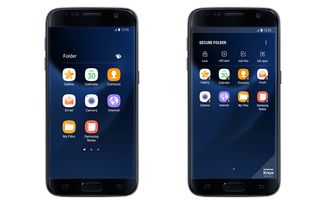Samsung 'Secure Folder' Brings Enterprise-Class Security To Consumers

Samsung offered Galaxy S7 and S7 Edge owners a taste of enterprise-ready security with the new Secure Folder. This special folder will allow consumers to hide apps from their home screen, keep sensitive data separate from other information, and use an extra layer of security for everything it contains.
Secure Folder is based on Samsung's Knox platform. That's the same tech that was cleared by the National Security Agency (NSA) for classified work in 2014. Now it's reached consumers, too, and other companies should follow Samsung's lead in helping people manage their private data with easy-to-use tools.
Samsung explained that Secure Folder offers a variety of options. This starts with how you access the feature: You can choose to set it up with an extra password, PIN, pattern, or biometric verification. Each has its benefits--biometric verification is convenient but also vulnerable to coercion, whereas passwords are secure but inconvenient--but the key is that Samsung lets you choose your preferred solution instead of forcing something on you.
Secure Folder also holds whatever information you want. It can be used to store documents, images, and other files on an individual basis, but it can also house entire apps. You can even store one version of an app in the Secure Folder while keeping another version of the app on your home screen. The two should never meet or share data. It's almost like they're using a different device altogether, but without the added costs of carrying around two phones.
This has recently become more important as people are asked to unlock devices when crossing the U.S. border, for example, or when law enforcement agencies have sought warrants that would've required everyone in a building to unlock their biometrically secured phones. Both are legal despite how invasive they can be (cops don't even need warrants to make people unlock thumbprint-enabled phones) and leave privacy-minded folks with little recourse.
Something like Secure Folder could help. Police can't force people to enter a password without a warrant, so keeping sensitive information in a password-protected Secure Folder can let people combine the convenience of biometric features with the added security of alphanumeric passwords. Information stored in a hidden Secure Folder could also evade the notice of someone rifling through a phone they stole or forced someone to unlock.
Secure Folder probably isn't foolproof. It's easy for companies to make security mistakes, and the feature's novelty means that even though Knox is trusted by America's top intelligence agency, Secure Folder itself might have some flaws. There's also the ol' wrench rule that states that everyone thinks digital security makes them impervious to snooping, when in reality they can just be hit with a wrench until they finally agree to comply.
Stay on the Cutting Edge
Join the experts who read Tom's Hardware for the inside track on enthusiast PC tech news — and have for over 25 years. We'll send breaking news and in-depth reviews of CPUs, GPUs, AI, maker hardware and more straight to your inbox.
But the point here is that Samsung is giving people more options and recognizing the reality of personal security. Not everyone is worried about far-off hackers accessing their devices. Many people just want to keep information from abusers, for example, or from nosy friends and family members. Secure Folder is flexible enough to help with both scenarios and approachable enough that people won't be too scared to even give it a whirl.
And that's a real problem with many security tools. Pew recently found that many Americans know they've been hacked, don't trust others to keep their personal information safe, and don't follow basic security principles. That's often because security can be daunting. Who wants to learn how to use PGP to protect their emails? Or try to remember a lot of unique passwords? Or scrutinize every link that hits their inbox? Some people do, but many don't.
Even if Secure Folder turns out not to be perfect, Samsung has at least given people more control over the information stored on their phones.

Nathaniel Mott is a freelance news and features writer for Tom's Hardware US, covering breaking news, security, and the silliest aspects of the tech industry.
Most Popular

